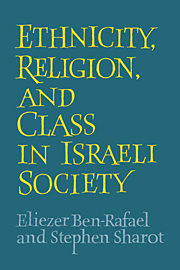Book contents
- Frontmatter
- Contents
- Acknowledgments
- I Theoretical and empirical background
- II Social patterns and behavior
- 5 Neighborhoods: synagogues and neighborhood committees
- 6 Religiosity and secularization
- 7 Friendship networks
- III Identities and images
- IV The impact of stratification
- V Social cleavages: an overview of Israeli society and some theoretical implications
- Appendix A The sample
- Appendix B Deprivation index
- Appendix C Indexes of ethnic identification
- Glossary
- Notes
- References
- Index
6 - Religiosity and secularization
Published online by Cambridge University Press: 12 September 2009
- Frontmatter
- Contents
- Acknowledgments
- I Theoretical and empirical background
- II Social patterns and behavior
- 5 Neighborhoods: synagogues and neighborhood committees
- 6 Religiosity and secularization
- 7 Friendship networks
- III Identities and images
- IV The impact of stratification
- V Social cleavages: an overview of Israeli society and some theoretical implications
- Appendix A The sample
- Appendix B Deprivation index
- Appendix C Indexes of ethnic identification
- Glossary
- Notes
- References
- Index
Summary
Secularization and its limits
Our investigations of neighborhoods and ethnic synagogues have pointed to the important relationship between religion and ethnicity. If religiosity in Israel is an important basis of ethnicity, secularization would necessarily lead to a decline in ethnicity. In this chapter, we present the findings from our survey that relate to the question of secularization among the four groups of origin, Moroccans, Iraqis, Poles, and Rumanians.
Secularization, “the process by which religious institutions, actions, and consciousness lose their social significance,” has commonly been viewed either as a dimension or as a consequence of modernization; industrialization, urbanization, the growth of science and technology, the spread of education, the development of the mass media, and the participation of the masses into political society have been seen as contributing factors in the decline of religion (Wilson, 1966,1982; Berger, 1967). Secularization is not, however, an inevitable consequence of the many developments that have often been grouped together under the term “modernization,” and the relationships of these two multidimensional processes vary considerably depending on the religious, cultural, and social contexts. In many Islamic societies developments such as urbanization and expansion of higher education appear to have contributed to the contemporary resurgence of Islam (Arjomand, 1986).
- Type
- Chapter
- Information
- Ethnicity, Religion and Class in Israeli Society , pp. 87 - 100Publisher: Cambridge University PressPrint publication year: 1991

